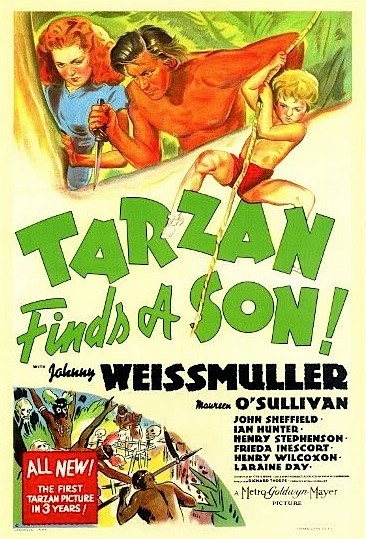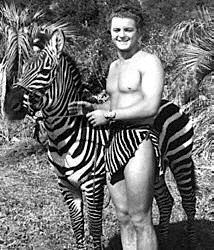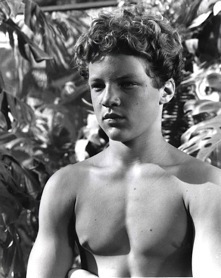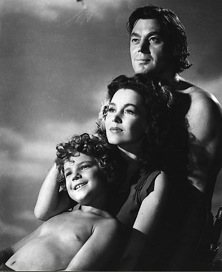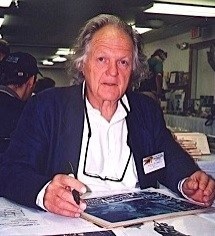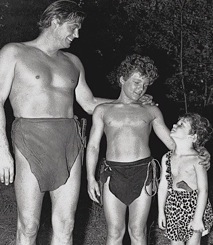Johnny Sheffield
d. Oct. 15, 2010
Johnny Sheffield, child actor who played Boy in the 1940s Tarzan movies starring Johnny Weissmuller and then starred in his own film series as Bomba the Jungle Boy, died Oct. 15 at his home in Chula Vista, Calif., from a heart attack. He was 79.
Four hours before his heart attack, Sheffield fell from a ladder while pruning a palm tree, his wife Patty told the Los Angeles Times. “He was a jungle boy to the end," she said, noting that her husband of 51 years was not high in the tree when he fell but "sometimes he was way up there."
Sheffield was already a Broadway veteran — appearing with Frances Bavier, Dick Van Patten and longtime Broadway performer Dudley Digges in “On Borrowed Time” in 1938 — when his father, British actor Reginald Sheffield, saw an ad in The Hollywood Reporter that asked, "Do you have a Tarzan Jr. in your back yard?" Metro-Goldwyn-Mayer was casting the part of a child adopted by Tarzan and Jane after his parents died in a jungle airplane crash. “Tarzan Finds a Son,” released in 1939, was the fourth in MGM's Tarzan series starring Weissmuller as the jungle lord and Maureen O'Sullivan as Jane.
Sheffield beat out a reported 300 boys for the role and was personally selected by Weissmuller to become one of the family. “Part of the selection process was a swimming test with Weissmuller," Sheffield recalled. “I could not swim a stroke, but Big John liked me and said he would give me the test anyway ... he only wanted to be sure I wasn't afraid of the water and that I was willing to try to swim.”
After signing him for their Tarzan films, MGM also put Sheffield into “Babes in Arms” (1939) with Mickey Rooney and Judy Garland, and loaned him out to RKO for the title role in “Little Orvie” (1940), and to Fox for “Lucky Cisco Kid” (1940) starring Cesar Romero. He appeared with Pat O’Brien and Ronald Reagan in “Knute Rockne, All American” (1940), playing Rockne as a boy, and worked with Reagan again in “Million Dollar Baby” (1941).
MGM released “Tarzan’s Secret Treasure” in 1941 and “Tarzan's New York Adventure” in 1942, exhausting its six-picture deal with Tarzan creator Edgar Rice Burroughs. Producer Sol Lesser, who made one of the first sound Tarzan movies in 1932 with Buster Crabbe as the ape man, grabbed the rights and moved Weissmuller and Sheffield to RKO. O'Sullivan declined the offer to join them, happy to get out of the jungle after 10 years as Tarzan’s mate, so Jane was “away in England” before Brenda Joyce took the role in four of the six pictures Weissmuller and Lesser made at RKO.
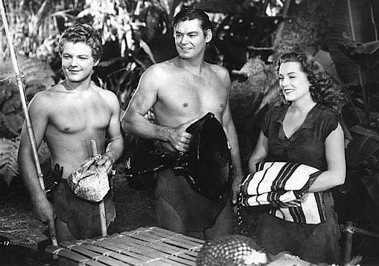
Sheffield, a cute, eight-year-old tyke when he played Boy for the first time, was 16 when the fifth RKO picture, “Tarzan and the Huntress,” was made in 1947. By then he towered over Joyce and was nearly as tall as Weissmuller. Lesser decreed he'd outgrown the role, so Sheffield and Boy were nowhere to be seen in the next film, 1948's “Tarzan and the Mermaids.” That picture also marked the end of Weissmuller's 16-year run as Tarzan. He traded in his loincloth for a safari jacket and moved to Columbia to play Jungle Jim, while Monogram snagged Sheffield for “Bomba the Jungle Boy.”
One of the countless jungle heroes to follow in Tarzan's success, Bomba appeared in 1926 in the first of a series of books churned out by the Stratemeyer Syndicate, home of such enduring juvenile adventurers as Nancy Drew and the Hardy Boys. After growing up in a celluloid jungle, Sheffield was perfect for the part and Monogram starred him in 12 Bomba pictures between 1949 and 1955.
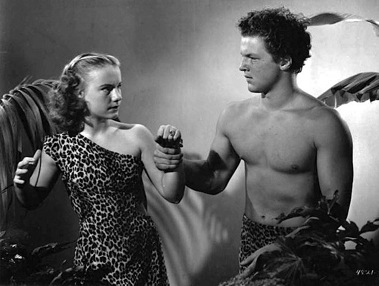
“I loved it because I was now the star,” Sheffield told the San Jose Mercury News in 1997. “We filmed them all on a sound stage, but I was amazed at the production quality we got in them.”
The end of the Bomba films coincided with the end of all such B-movie series and chapter serials as movie attendance fell and low-budget film work moved to television. Sheffield tried to continue his familiar jungle roles by playing “Bantu the Zebra Boy” in a TV pilot produced by his father. It didn't sell and Sheffield retired from show business at the age of 24.
He got a business degree from UCLA and moved to Yuma, Ariz., where he worked for a large farming concern. He later returned to California, where he worked as a contractor and dabbled in Malibu real estate, and also spent many years with a company that imported lobsters from Mexico.
Though his Bantu pilot didn’t sell, Sheffield’s Bomba movies became a minor rage on TV in the early 1960s. WGN in Chicago started running them once a week in the early evening under the umbrella title “Zim Bomba,” with the films cut from their original 65- to 70-minute lengths to fit a one-hour timeslot with commercials. The huge reaction from viewers caused Allied Artists, the successor to Monogram, to recut the 12 pictures into 13 TV episodes also designed to run in one-hour timeslots with commercials. This “Zim Bomba” package remained in syndication through the 1970s.
